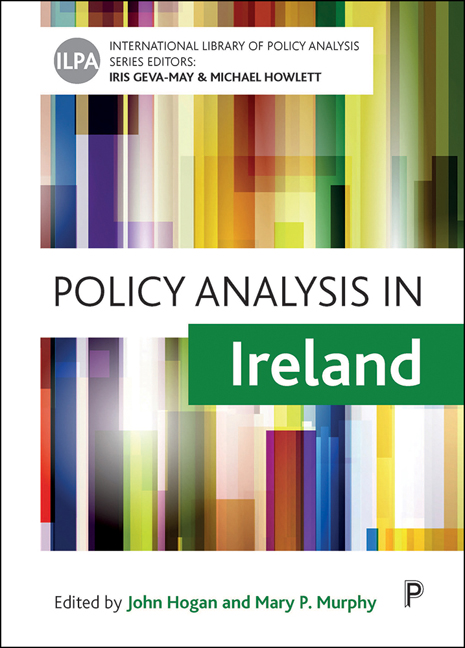Book contents
- Frontmatter
- Contents
- List of figures, tables and boxes
- List of abbreviations
- Notes on contributors
- Editors’ introduction to the series
- Acknowledgements
- Foreword
- Preface
- one Contextualising policy analysis in Ireland
- Part One: History, styles and methods of policy analysis in Ireland
- Part Two: Policy analysis at various levels of government: from local to the EU
- Part Three: Think tanks, interest groups, political parties and gender-based policy analysis
- Part Four: The public, science and the media: the wider policy analysis environment in Ireland
- Index
three - The evolution of social policy analysis in Ireland: from a theocentric to an econocentric paradigm?
Published online by Cambridge University Press: 18 December 2021
- Frontmatter
- Contents
- List of figures, tables and boxes
- List of abbreviations
- Notes on contributors
- Editors’ introduction to the series
- Acknowledgements
- Foreword
- Preface
- one Contextualising policy analysis in Ireland
- Part One: History, styles and methods of policy analysis in Ireland
- Part Two: Policy analysis at various levels of government: from local to the EU
- Part Three: Think tanks, interest groups, political parties and gender-based policy analysis
- Part Four: The public, science and the media: the wider policy analysis environment in Ireland
- Index
Summary
Introduction
This chapter discusses the history of social policy analysis in the Ireland, tracing its evolution since the late 1950s and tracking Ireland's emergence from a relatively insular and theocentric context to a much more diverse, wealthy and globalised society. The ongoing challenges of social policy analysis are explored under what might be characterised as a shift from the dominance of a theocentric paradigm to an econocentric paradigm that privileges the economic in how social policy is valued and how social policy analysis is conducted. An econocentric mode of thinking about social policy and society is certainly not exclusive to Ireland but the chapter aims to draw out its localised effects in the Irish context.
Framing the history of Irish social policy analysis as a transition from a theocentric to an econocentric paradigm risks being facile and simplifying more complex realities. In each case, I suggest that these are relatively dominant rather than total paradigms and the transition is not necessarily linear. Counter-currents always exist, and the chapter seeks to acknowledge and critically analyse these too (see Chapter Fourteen, this volume). Evoking Dean's (2018) image of the reach of social policy as a promiscuous magpie, the chapter consequently casts a relatively wide net, including over governmental and academic settings, but also aims to recognise the wider landscape of actors, advocates and forms of knowledge influencing social policy analysis, including social movements, the media and non-governmental organisations (NGOs) (see Chapter Twelve, this volume). These parameters necessarily mean that a broad sweep is presented, raising many avenues that require further research beyond the scope of this chapter. The chapter proceeds in three sections: first, focusing on the late 1950s and 1960s as a period in which theocentric social policy analysis was beginning to decline; second, looking at the 1970s and the 1980s as a period when more distinct modes of social policy analysis, with a particular focus on poverty and inequality began to emerge; and third, looking at the 1990s to the late 2000s as a time when social change accelerated and significant change to how social policy was analysed took place on many fronts. The chapter concludes with a brief reflection on the contemporary period, noting the more explicit reassertion of econocentric modes of analysis.
- Type
- Chapter
- Information
- Policy Analysis in Ireland , pp. 33 - 46Publisher: Bristol University PressPrint publication year: 2021



